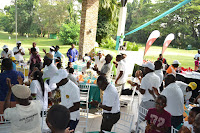The Christian Health
Association of Ghana (CHAG) has called on government not to take for granted
the services member facilities of the Association were rendering a large
segment of Ghanaians in the rural area.
As provider of over 40
percent of health care in the country, the new Chairperson of the CHAG Board
has entreated government as a matter of urgency expedite repayment of the debts
owed CHAG Facilities by the National Health Insurance Scheme.
Dame Dr. Agatha Ekua
Bonney, the CHAG Board Chairperson made the appeal to government interview,
highlighting the serious threat the indebtedness was posing to health care
provision in rural areas and in the entire country.
She narrated the huge pressure
on facilities to pay their suppliers and the shortage of critical medical
consumables to help sustain the delivery of health care to Ghanaian.
She described the huge
debts of over 13 months as severely hampering the delivery of quality
healthcare and demoralizing genuine efforts of many CHAG Facilities dotted
around remote areas to provide quality health care.
Dame Dr. Akua Bonney
strongly appealed to the Government to as a matter of urgency consider settling
the indebtedness of NHIA and ensure the immediate reimbursement to the health
facilities for services they were rendering.
She expressed the desire
of the Association to continue to dialogue with the government to ensure the settlement
of the debts owed its member facilities, while pledging CHAG’s commitment to work
with other stakeholders to find lasting solution and sustainable means of
funding health care in Ghana.
“As a Christian
association we are unable to lay down our tools due to our principles of
compassion to the patient, even though our facilities are really suffering” she
echoed, appealing to the Government to consider their plight and ensure that
payment were made to save the health facilities from collapsing.
Funding
NHIS
To ensure NHIS is not
starved of cash, the CHAG Board Chairperson suggested that NHIS Fund be
decoupled from the consolidated fund and used solely for what it was
established for.
Given the challenge of
the huge indebtedness to health facilities, she observed that ensuring
sustainable health funding was paramount, to the delivery of quality health
care, which is critical to Ghana’s development.
Dame Dr. Ekua Bonney,
stated that CHAG which started the pilot of project of the health insurance at
Nkoranza in the 90s is very much interested in its sustenance, but said if the
NHIS were properly managed it would not be facing the challenges it was facing.
“Make NHIS fund work
solely as it was set up,” she stressed.
Vision
The Chairperson said the
New Board would work in line with the vision of the founding fathers and ensure
that CHAG and its member facilities become the best quality health care delivery
centres throughout the country.
Under their three-year
mandate, the Chairperson noted that the Board would prioritize patient care and
satisfaction in the delivery of quality health care at throughout CHAG member
facilities in the country.
She explained further
that appropriate patient care and customer satisfaction were a prerequisite in
the process of giving holistic healthcare delivery.
As CHAG marks its Golden
Jubilee this year, Dame Dr. Ekua Bonney said the association would introduce
strategies to improve and uphold high standards of holistic health care to the
patient, which includes strengthening staff orientation on the new trends in
patient care and customer satisfaction at all levels.
Faced with the hurdle of
dwindling donor funds, huge debt of NHIS to facilities and a commitment to
continue the provision of quality healthcare delivery; Mr. Sam Sarpong Appiah,
Vice Chairperson, shared the vision of the Board to pursue mobilization of fund
locally to augment other sources of funds.
He therefore called for a
change in mentality and attitude in order to mobilize funds locally to aid the
continuous operation of the health facilities in the country.
The Vice Chairperson said
the Board vigorously promote prudent financial management regimes of funds and
encourage close working relations between facilities and communities in which
they operate in to rally support for their growth.
Poor
and sick fund
In spite of the financial
constraints, the Chairperson and the Vice reiterated the fact that most CHAG
facilities were doing their best to assist patient meet the cost of treatment
through the Poor and Sick Fund they established.
The Board Chairperson
pledged CHAG’s committed to continue providing holistic health care delivering,
which will offer spiritual, mental and emotional health care that hinges on the
tenets of respect for patient’s dignity, and concern for the health needs of
clients in a Christ like manner.
New
Board members
Among the 16-member Board
of CHAG chaired by Dame Dr. Agatha Akua Bonney, assisted by Mr. Sam Sarpong
Appiah; as well as Dr. Yao Yeboah; Alex Kofi Osei Owusu, ESQ.; Mr Osei Yaw
Asamoa; Mr. Mauurice Adu-Amankwah; and Mr Julius Wellens-Mensah.
Others are Mr. Peter K.
Yeboah, Executive Director of CHAG; Dr. Elias K. Sory; Joseph A. Aryitey, ESQ.;
GEAORGE A. Adjei, ESQ.; Ms. Margaret Mary Alacoque Dapilah, and Dr. Frederick
E.M. Kustsienyo, as well as Mr. Lawrence Ofosu Adjare; Mr Enoch Osafo, and Presbyter
Jonas Gershon Dzodzodzi.


















